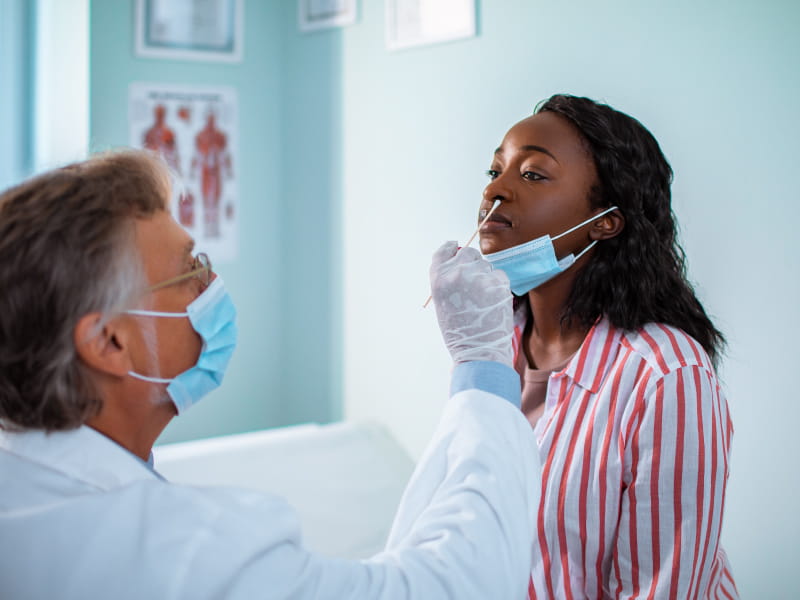Researchers explore how COVID-19 affects heart health in Black women
By Laura Williamson, American Heart Association News

Nearly six months into the COVID-19 pandemic, two things have become clear: The virus profoundly impacts people with heart disease and disproportionately impacts Black people. But the many manifestations of these disparities remains unclear, particularly for one group regularly left out of medical research.
"African American women are often at the intersection of the worst economic and health disparities," said Dr. Michelle Albert, a cardiologist and professor of medicine at the University of California, San Francisco. "They are a group that is often overlooked."
In a collaborative investigation with the Slone Epidemiology Center at Boston University, Albert is leading a study to look at a cohort of women enrolled in the Black Women's Health Study to determine the myriad ways in which COVID-19 is impacting them.
She said she chose to study this demographic because Black women often are at higher risk for heart disease than women in other demographic groups, and they are shouldering an excessive burden during the pandemic.
African Americans with COVID-19 are nearly three times as likely to require hospitalization than white people with the disease, according to a recent study published in the journal Health Affairs. According to statistics compiled by the nonprofit American Public Media Research Lab, Black and Indigenous people die from COVID-19 at more than three to four times the rate of white people.
Cardiovascular disease, research shows, could play a substantial role in those deaths. And for African American women especially, the risks for heart disease are high. Four out of 5 Black women are considered overweight or have obesity – the highest rate of any group in the country, according to the U.S. Office of Minority Health, and they are 60% more likely to have high blood pressure than their white counterparts.
Those risks didn't happen in a vacuum, experts say. Numerous factors place greater stress on African American women that can affect their health.
"The United States has a longstanding history of disparities in education, income, wealth and housing, and these factors, or social determinants of health, disproportionately affect African Americans – and African American women in particular," said Yvonne Commodore-Mensah, assistant professor at Johns Hopkins School of Nursing and the School of Public Health in Baltimore. She also is a faculty member at Johns Hopkins' Center for Health Equity.
"These social determinants of health result in a burden of underlying risk factors for COVID-19: high blood pressure, diabetes, overweight and obesity. These risk factors increase the risk for severe COVID-19 illness and mortality."
African American women may also be more exposed to contagion, said Dr. LaPrincess Brewer, assistant professor of medicine in the Mayo Clinic's department of cardiovascular medicine in Rochester, Minnesota. "They are more likely to hold service sector jobs that increase their risk of exposure to COVID-19. They are more likely to serve as heads of household."
What's more, Albert said, "they are caregivers of multiple generations, including children and elderly relatives and extended family. And they are more likely to experience every kind of bias – medical as well as racial/ethnic biases – in housing and employment."
All of these factors multiply stress, which can impact heart health.
"This pandemic has really affected the livelihood of the African American community and the ability of community members to maintain a healthy lifestyle," said Brewer. "It's largely related to the extreme burden of stressors resulting from this crisis."
But as evidence begins to emerge showing COVID-19 has a widespread, adverse impact on cardiovascular health, the data is not being collected in ways that allow researchers to look at its impact on specific demographic groups – information that could be critical in helping to identify treatments and prevention strategies for those at highest risk.
Albert's study was among a dozen recently funded by the American Heart Association to investigate heart and brain issues related to COVID-19. The AHA also created a COVID-19 CVD Registry that is working to enroll historically underrepresented groups. The registry is collecting data from thousands of COVID-19 patients nationwide to advance the work of scientists, doctors and researchers investigating the coronavirus.
Albert said she hopes her research findings pinpoint the experiences and perceptions of African American women so that targeted solutions can be developed.
The research community needs to do more studies like this, those in the field say.
"When we collect data, we have to report it systematically, so we can analyze it to understand what complications may affect African American women differently than white women," Commodore-Mensah said. "Without this data, we have an incomplete picture of what affects the risk for severe COVID-19 illness and death.
"Women in general are not well represented in research studies on cardiovascular health," she said. "Compounding that, Black women are less represented than white women, for different reasons."
They may be unable to get off work to take part in clinical trial visits, she said. Or those recruiting patients may lack cultural sensitivity. Further compounding the issue is a deep-seated distrust of the medical research community, which has a long history in the United States of unethical treatment, abuse and exploitation of African American patients.
Commodore-Mensah said those challenges could be overcome by doing a better job of communicating the benefit of research studies and making sure trusted individuals, such as faith and community leaders, are the ones delivering those messages.
"We also need to make sure the research team reflects the population we are studying," she said.
Editor's note: Because of the rapidly evolving events surrounding the coronavirus, the facts and advice presented in this story may have changed since publication. Visit Heart.org for the latest coverage, and check with the Centers for Disease Control and Prevention and local health officials for the most recent guidance.
If you have questions or comments about this story, please email [email protected].





